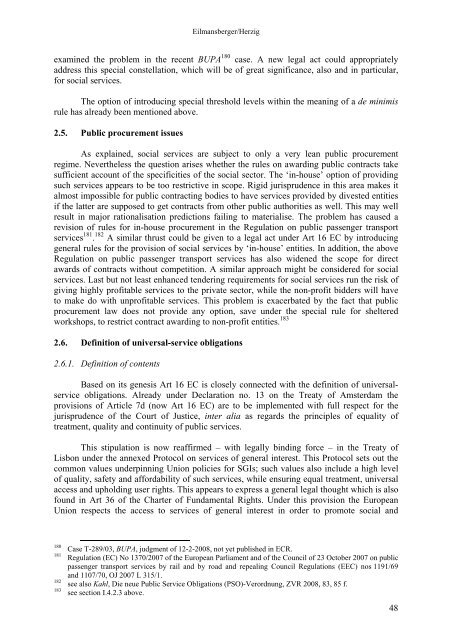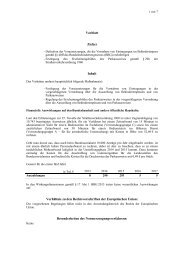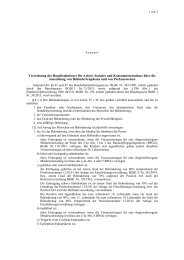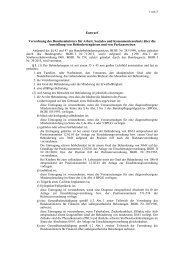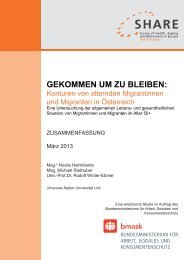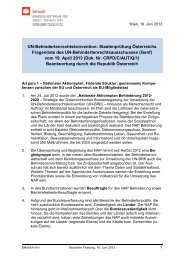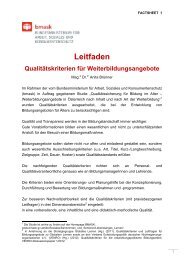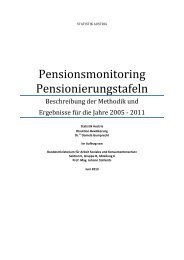Social Services of General Interest (SSGI)
Social Services of General Interest (SSGI)
Social Services of General Interest (SSGI)
Create successful ePaper yourself
Turn your PDF publications into a flip-book with our unique Google optimized e-Paper software.
Eilmansberger/Herzig<br />
examined the problem in the recent BUPA 180 case. A new legal act could appropriately<br />
address this special constellation, which will be <strong>of</strong> great significance, also and in particular,<br />
for social services.<br />
The option <strong>of</strong> introducing special threshold levels within the meaning <strong>of</strong> a de minimis<br />
rule has already been mentioned above.<br />
2.5. Public procurement issues<br />
As explained, social services are subject to only a very lean public procurement<br />
regime. Nevertheless the question arises whether the rules on awarding public contracts take<br />
sufficient account <strong>of</strong> the specificities <strong>of</strong> the social sector. The ‘in-house’ option <strong>of</strong> providing<br />
such services appears to be too restrictive in scope. Rigid jurisprudence in this area makes it<br />
almost impossible for public contracting bodies to have services provided by divested entities<br />
if the latter are supposed to get contracts from other public authorities as well. This may well<br />
result in major rationalisation predictions failing to materialise. The problem has caused a<br />
revision <strong>of</strong> rules for in-house procurement in the Regulation on public passenger transport<br />
services 181 . 182 A similar thrust could be given to a legal act under Art 16 EC by introducing<br />
general rules for the provision <strong>of</strong> social services by ‘in-house’ entities. In addition, the above<br />
Regulation on public passenger transport services has also widened the scope for direct<br />
awards <strong>of</strong> contracts without competition. A similar approach might be considered for social<br />
services. Last but not least enhanced tendering requirements for social services run the risk <strong>of</strong><br />
giving highly pr<strong>of</strong>itable services to the private sector, while the non-pr<strong>of</strong>it bidders will have<br />
to make do with unpr<strong>of</strong>itable services. This problem is exacerbated by the fact that public<br />
procurement law does not provide any option, save under the special rule for sheltered<br />
workshops, to restrict contract awarding to non-pr<strong>of</strong>it entities. 183<br />
2.6. Definition <strong>of</strong> universal-service obligations<br />
2.6.1. Definition <strong>of</strong> contents<br />
Based on its genesis Art 16 EC is closely connected with the definition <strong>of</strong> universalservice<br />
obligations. Already under Declaration no. 13 on the Treaty <strong>of</strong> Amsterdam the<br />
provisions <strong>of</strong> Article 7d (now Art 16 EC) are to be implemented with full respect for the<br />
jurisprudence <strong>of</strong> the Court <strong>of</strong> Justice, inter alia as regards the principles <strong>of</strong> equality <strong>of</strong><br />
treatment, quality and continuity <strong>of</strong> public services.<br />
This stipulation is now reaffirmed – with legally binding force – in the Treaty <strong>of</strong><br />
Lisbon under the annexed Protocol on services <strong>of</strong> general interest. This Protocol sets out the<br />
common values underpinning Union policies for SGIs; such values also include a high level<br />
<strong>of</strong> quality, safety and affordability <strong>of</strong> such services, while ensuring equal treatment, universal<br />
access and upholding user rights. This appears to express a general legal thought which is also<br />
found in Art 36 <strong>of</strong> the Charter <strong>of</strong> Fundamental Rights. Under this provision the European<br />
Union respects the access to services <strong>of</strong> general interest in order to promote social and<br />
180 Case T-289/03, BUPA, judgment <strong>of</strong> 12-2-2008, not yet published in ECR.<br />
181 Regulation (EC) No 1370/2007 <strong>of</strong> the European Parliament and <strong>of</strong> the Council <strong>of</strong> 23 October 2007 on public<br />
passenger transport services by rail and by road and repealing Council Regulations (EEC) nos 1191/69<br />
and 1107/70, OJ 2007 L 315/1.<br />
182 see also Kahl, Die neue Public Service Obligations (PSO)-Verordnung, ZVR 2008, 83, 85 f.<br />
183 see section I.4.2.3 above.<br />
48


